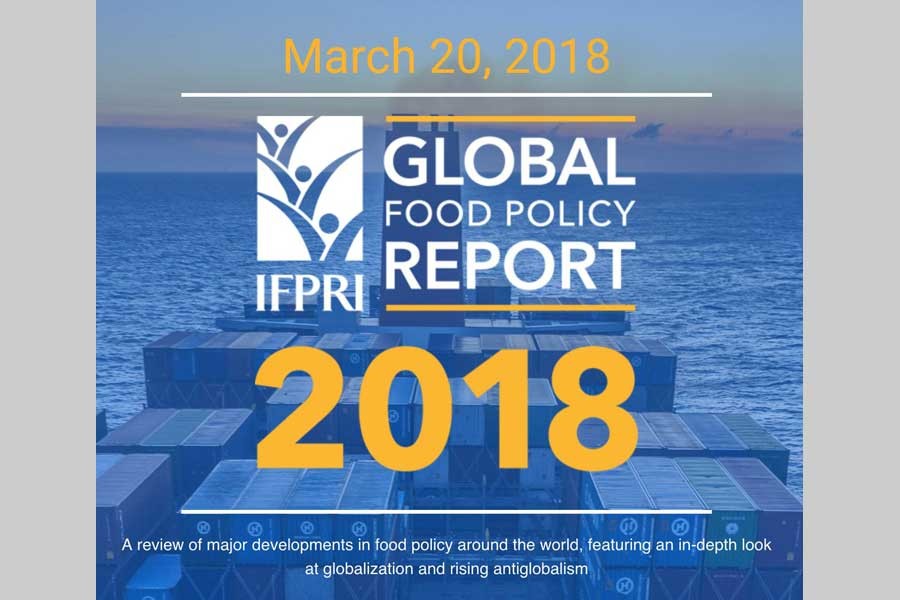
Published :
Updated :

The International Food Policy Research Institute (IFPRI) recently organised a launching ceremony of the 2018 Global Food Policy Report in the capital. The ceremony kicked off with welcome address by the Country Representative and keynote paper from the Director General of IFPRI. The Global Food Policy Report 2018 (http://gfpr.ifpri.info/) reviews major food policy issues and developments from the past year, with an eye on what could happen in 2018. The report appears to have taken an in-depth look into the impacts of globalisation-including the movement of goods, investment, people and knowledge as well as the challenges of growing anti-globalisation pressures.
The year 2017 was marked by progress amid uncertainties - says the report. Strong economic recovery was marred by conflict-induced hunger in different parts of the world. The report is of the view that food systems in South Asia is passing through a critical phase. Bangladesh can duly boast of its achievements in the food sector with commendable progress in food and nutrition security. However, concerns of insecurity still looms large on the horizon as significant challenges remain, such as mitigating climate change effects, strengthening food value chains, promoting intra-regional trade, among others.
While there has been a considerable reduction in poverty, hunger and under-nutrition across the globe over the years, the Report takes note of certain discomforting areas. For example, as the report reads, today's food systems are contributing to health and environmental crises. Many national food systems are rapidly transitioning toward diets that are too high in salt, sugar, fat, and food systems are implicated in a range of environmental pressures. As acute as these challenges are, food systems are uniquely positioned to be a primary driver of improved human and environmental health.
The role of international free trade has been pitted against the emerging signs of restricted trade. Experience shows that trade plays a critical role in feeding the growing world population. As is well-known, widespread opening of trade has resulted in lowering the average cost of food worldwide. Trade has also enabled access to diversified food baskets. But the recent anti-globalisation sentiment, creeping up in America and Europe, is seemingly slowing the progress towards the Sustainable Development Goals (SDGs), greater economic growth, and improved food security and nutrition. Upcoming trade barriers might lead to higher food prices in land-scarce countries, depressed food prices in land-abundant countries, and lower real incomes in both. However, opening up trade is not an unmixed blessing. "The risks associated with trade opening-including rising inequality, health impacts, increased energy use and environmental damage-should be addressed with policies that directly target the source or root of the problem, rather than hamper trade. For example, over-nutrition and obesity should be addressed with education and other policies that directly target consumption", the Report says.
The Food Policy Report 2018 reckons that anti-globalisation and the changing global landscape are likely to continue impacting trade, investment, and migration, creating further political and economic uncertainties in the days to come. As the Report says, "Global economic growth is projected to strengthen in 2018, particularly in emerging economies, which could translate into improvements in livelihoods, incomes and food security. Rapidly advancing technologies, coupled with the global flow of knowledge, could be game changers for agriculture and food systems." But despite this relatively rosy economic outlook, threats to food security will persist on the heels of hunger fuelled by conflict and compounded by drought. In particular, African countries that suffered famine and drought in 2017 will remain vulnerable to food insecurity. Climate change will continue to pose immediate and long-term threats, and global cooperation will be essential as tensions over climate change grow.
Food can fix many problems. And to do so, our food systems must be transformed to deliver sufficient, affordable, delicious and healthy food for all within the bounds of sustainability. How do we get there? According to the Report, "Rather than stepping away from global integration, we must work to maximise the benefits and minimise the risks of global linkages. The global integration of national food systems-through the flow of goods, investments, people and knowledge-will be the key to progress, but will require good governance and strong commitment from the international community".
To transform food systems, an open, efficient, and fair trading system should be encouraged. Support should be provided to rural development to break the cycle of conflict, food insecurity and migration. Investments should be made in research and innovation as well as in evidence-based policies to promote the benefits of emerging technologies. At the global, regional and national levels, data and evidence must remain at the heart of more open, transparent and inclusive food systems. Last but not the least, strong political will, commitment and leadership from the global to the local level are needed to achieve global food security.
Abdul Bayes is a former Professor of Economics at Jahangirnagar University. [email protected]/abdulbayes @yahoo.com


 For all latest news, follow The Financial Express Google News channel.
For all latest news, follow The Financial Express Google News channel.